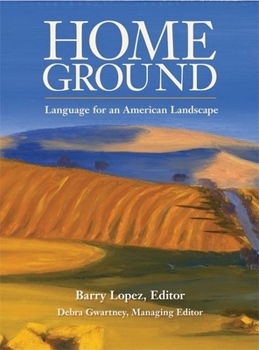Home Ground: Language for an American Landscape
Select Format
Select Condition 
Book Overview
Barry Lopez asked 45 poets and writers to define terms that describe America's land and water forms -- phrases like flatiron, bayou, monadnock, kiss tank, meander bar, and everglade. The result is a major enterprise comprising over 850 descriptions, 100 line drawings, and 70 quotations from works by Willa Cather, Truman Capote, John Updike, Cormac McCarthy, and others. Carefully researched and exquisitely written by talents such as Barbara Kingsolver,...
Format:Hardcover
Language:English
ISBN:1595340246
ISBN13:9781595340245
Release Date:September 2006
Publisher:Trinity University Press
Length:480 Pages
Weight:3.08 lbs.
Dimensions:1.5" x 7.8" x 10.3"
Customer Reviews
5 ratings
Nature Lover from Portola Valley loves Home Ground
Published by Thriftbooks.com User , 17 years ago
I'd recommend this book to anyone who reads widely and loves to discover the derivation of geographical terms pertainig to nature. What is unique about this book is the input from 45 well known writers to define unique American landscape terms. I ordered 3 copies for all my family located in the Pacific Northwest and they agree that this book is a great resource.
Landscapes and Language
Published by Thriftbooks.com User , 17 years ago
The book defines (with illustrations) terms used to describe land features, such as barranca, grand bois, quaking bog. It is primarily a book to dip into for fun or to consult as a reference. If you like descriptive terms (e.g., meander scar) or puzzling friends with new words, you will like this book.
Language for an American Landscape by Barry Lopez
Published by Thriftbooks.com User , 17 years ago
This is a very interesting book and should be in every bookcase along with an encyclopedia, dictionary and atlas. The brilliant idea of having great writers briefly define geological and geographic terms works beautifully.
A book you want to keep near you
Published by Thriftbooks.com User , 18 years ago
I took Home Ground home and set it on the dining room table two weeks ago. I open it over breakfast and feel a visceral pleasure--the robin's egg blue sky on the cover, the ample space on each page, the quotes lining the margins, the sketches of landforms. But the sensual reality of the book wouldn't do much for me if the definitions were boring. They're exquisite. This is more than a dictionary--no one else has tried such a project, so it's hard to describe. I tell people about it, but I don't know if I convey how much fun it is to read the definitions, and how lyrical and evocative and often playful they are. I can read them just for pleasure, but I am also learning those words I've always glossed over, the words I vaguely knew but which I thought belonged to the experts, words like "playa," "swale," "gooseneck," and "glade." The more technical phrases are explained in lucid, simple terms. And then there are the ones that are pure fun, like "thank you ma'am," "looking-glass prairie," "hoodoo," "painted desert," "milk gap," and "chickenhead." The definitions make me want to get out and notice the country. They make me believe in the beauty and specificity and continuing power of the American landscape. I feel a sense of loss for all the local folk knowledge that is now obscure. But it's also heartening to think that Americans have not only been looters; we've known the ins and outs of the land, paid attention, made it come to life in our words. And we can still reach for those words and for that clear-eyed, delighted way of seeing the land around us. This is a book to give and a book to keep in the family. I may not take it off my dining room table for a while. It's a good companion.
More than a reference, a Literary Anthology of our American Homeland
Published by Thriftbooks.com User , 18 years ago
When I first got my hands on this beautiful book, I'd barely read a page before I started to cry. Barry Lopez, Debra Gwartney, and more of the best writers of our day have saved what I didn't even realize I was losing. I've often felt, when near an exotic Asian or spicy islander that being an American, especially a Midwesterner, meant I had no culture. The United States was developed under the influence of a vast wild land, a land to conquer. We tore down and built up, paying little attention to what we destroyed. I wonder if that accounts for empty Americans trying to fill themselves up with stuff? But the U. S. isn't only about development and acquisition. Home Ground preserves the culture and language of our landscape. "we will conserve only what we love we will love only what we understand we will understand only what we're taught" Baba Dioum, Senegal The marginalia literature quotations and the descriptive entries bind place to culture. Because I do feel a connection to the landscapes I have known, this book reminds me that I am a part of a culture that has a language. A language we might have lost.






